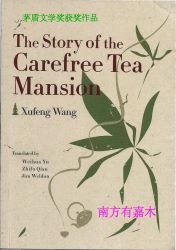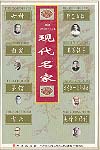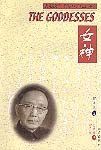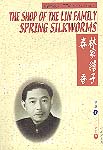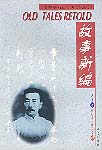The Story of the Carefree Tea Mansion
$17.97
In stock
Description
The Story of the Carefree Tea Mansion
Author: Xufeng Wang
Order No. 1207
ISBN-13: 9781622461011
ISBN-10: 1622461010
Binding: Paperback
Publisher: Homa & Sekey Books
Pub Year: 2022
Language: English
Size: 5.75 x 8.25
Page: 661
Price: $29.95. You pay only $17.97 (after 40% discount).
About the Book
The story takes place in Hangzhou, the capital of green tea in China at the end of the Qing dynasty. Hang Jiuzhai, heir to the Carefree Tea Mansion, was elegant and graceful, but not good at managing money, and eventually died on the opium bed of a woman. The next generation of tea man is Hang Tianzui, who grew up in the era of the complete collapse of the feudal dynasty and the birth of the Republic of China. He has always been intertwined with the contradictions of decadence and vigor. He is knowledgeable, talented, passionate, and ambitious, but he is indecisive, loves boyfriend, loves wife, loves concubines, and loves children… In the end, “love” is lost and he has no choice but to flee to Buddhism.
The three sons and two daughters of Hang Tianzui experienced a broader era. They participated in the whole process of the rise and fall of Chinese tea in various identities and different ways. In the meantime, the nation, the family and their personal destinies are tangled with twists and turns. The rise and fall of the tea mansion are closely related to the rise and fall of Chinese tea in the past century.
The Trilogy of the Tea Masters is the first fictional series intertwined with a profound and colorful tea culture and the destinies of various generations of the Chinese tea people in modern China. The Story of the Carefree Tea Mansion is the first book in the trilogy.
About the Author
Xufeng Wang is a professor of Chinese literature at Zhejiang A&F University and vice chairman of Zhejiang Writers Association of China. Her first two volumes of The Trilogy of the Tea Masters won the Fifth Mao Dun Literature Award—the most prestigious national award for outstanding novels in 2000. She has won the National Book Awards for Literary Works four times, and has won many other awards, including the Xu Chi Reportage Award for excellent literary works.
About the Translators
Weihua Yu is a Ph.D., Professor, and Dean of School of English Language at Jilin International Studies University, P.R. China. Zhifu Qian is an Associate Professor, and Ph.D. of School of English Language, Zhejiang Yuexiu University, China. Jim Weldon, a British freelance translator, winner of the People’s Literature Translation Prize 2013.
Book Excerpt
In 1920, while the Don-Quixote-like May Fourth youth Hang Jiahe was fighting a lone battle in the Dragon-well countryside, another May Fourth youth from Shangyu, Zhejiang province, was sitting at the desk of the Tea Test site of the Ministry of Agriculture and Fisheries, Shizuoka, Japan, studying diligently with a quiet mind of the tea civilization of countries in the world.
This man was a big-eyed tall man with a bright and generous personality, formerly known as Wu Rongtang. When he was young, he had witnessed a farmer who could not pay their rent being imprisoned in the iron cage in front of the county Yamen, i.e., government office-building in feudal China, exposed to the sun and rain and died of misery, so he made a painful decision to revitalize agriculture in China. He renamed himself as Wu Juenong because “one of the Buddha’s names is Jue, that means being inspired, only the self-inspired could inspire others.”
For agriculture, Wu Juenong chose tea as his major, thinking that tea, like silk, was one of the two special local products that the Chinese people take pride in front of common people of the world, and was also one of the two magic weapons to revitalize Chinese agriculture. Originally, China has a favorable and heaven-like natural environment for tea planting. The reason why we lose is that we are “not willing to improve in a world with strong scientific development, but pride ourselves on being out of the ordinary on the basis of a little natural benefit.”
Wu Juenong traveled east to Japan to study tea industry because Japanese green tea at that time had already become a leading player in the international market. Wu Juenong, 22, graduated from Zhejiang Agricultural Junior College in 1919 and had been an assistant teacher for three years. As an overseas student with government grant, the ambition of revitalizing Chinese tea industry has been brewing in his bosom for a long time.
Up to this time, in the 1920s, China’s tea industry did not seem to have made much progress. From the peak of development, it continued to go to a period of suffering a disastrous decline. The reason is that warlords causing years of chaos, political changes, economic recession, people’s hardship and hard work, and business travel is not accessible. Outside, the competition of Chinese tea in the international market had failed. At that time, new tea-producing countries such as Dutch East India (Indonesia), India, Ceylon (Sri Lanka) emerged one after another. Scientific planting led to a sharp increase in tea production and export. In addition, mechanical tea-making, with excellent quality, had a strong competitiveness in the international tea market. However, Chinese tea was self-proclaimed, did not seek improvement with quality decline, cost increase and poor management. As a result, the black tea market in Britain and Russia was gradually seized by India, Sri Lanka and other countries, while the green tea and oolong tea market was occupied by Japan, and the export was on the verge of extinction.
In Japan, he had read such academic papers.
The British botanist Blak put forward in his book Tea Merchants’ Guide, “Many scholars have proposed that the origin of tea should be India, not China, in terms of its superiority and luxuriance.”
In the book Tea written by Jabbebson, it was said that only cultivated tea trees can be found in China, and absolutely wild tea trees cannot be found. The Assamiea was the only wild tea plant found in Asa, and botanists regard it as the ancestor of all tea plants.
In addition, Browne’s Tea, published in London, said: There was no wild tea tree found in China, and there was no record in the ancient books that the tea tree originated in China. This was the strongest evidence that supports the Indian theory.
The Grand Dictionary of Japan also said: The native place of tea was in East India.
It can be said that since the British opened up Indian tea gardens to make Indian tea, British businessmen have called Indian tea as “Our Tea.” The parliamentary government has given a special discount of one fifth of the import tax on Indian tea.
The year when Wu Juenong wrote Textual Research on the Origin of Tea Trees coincided with the age of 25, which was 1922. The thesis began with a clear idea: China had thousands of years of history of tea industry. As the producer of tea for the whole world, no one can deny that China was the origin of tea if he has studied the history of China intentionally. But the traditional literal scholars, with Imperialist’s mind, have commercialized their studies, and insisted on playing with words, quoted fallacies, and made people in the world unable to distinguish and believe that China was not the origin of tea trees. He protested angrily and sadly in a lonely foreign country: “Everything in a decadent country will be plundered by others! And the plunder is nothing more than the fact that even the plants that grow in our country will change their nationality for no reason!”
Finally, with the sincere heart of a young man, he called out loudly: China’s tea industry is like a sleeping lion. Once it wakes up, it will never fall behind forever. I hope you all work hard.
Only in the first half of the 20th century, it was a tragic era for a Chinese agronomist and tea expert with such an expertise. With warlords’ warfare, political corruption, rural deprivation and farmers’ poverty, Wu Juenong’s appeal was like a sigh rarely heard.
This seemed to be an unrelated response: The Carefree Tea Mansion began its next round of historical course. This dangerous green road, made of tea, seemed to be full of fortresses, without any sign of dark willows and bright flowers. Hang Jiahe himself cannot know whether his marriage can be regarded as the bright color of the hard times.
During the Spring Festival of 1921, Hang Jiahe, who was coming of age at 20, married Fang Xiling, who was one year older than him, and greeted the parents in his former residence at the Carefree Tea Mansion, being husband and wife.
Fang Xiling’s father, Lawyer Fang Boping, was satisfied with this marriage. Although he is a scholar studying abroad, he always cherishes his reputation and pays special attention to the virtuous cycle effect of marriage. For him, Jiahe was more like a nephew of Shen Lücun, a key member of the Kuomintang Party rather than a minor owner of the Carefree Tea Mansion. All his comments on this ideal son-in-law come from the introduction of Shen Lücun who said that this young man was of perseverance and composure, an external gentleness mingling with internal rigidity, and surely will make great achievements in the future. “I’m not praising him,” Shen Lücun said passionately. “Jiaping and I are really related by blood, but whoever wants to marry Jiaping will be finished. For Jiaping, it is better not to have given birth to him. No one can say for sure what he will be like in the future.”
Fang Boping told all these words to his capricious and only daughter, but her daughter would not listen to him then. Instead, when she heard others describe Jiaping as a Satan, she became even more infatuated with Jiaping and finally eloped for him.
It’s all right now. His daughter came back, and finished kneeling three times, kowtowing six times and worshiping heaven and earth in the bright red and bold green in accordance with the ancient Chinese custom.
The Hang family’s attitude toward this daughter-in-law was very hesitant at first, and Hang Tianzui’s attitude was the simplest. “Let Jiahe himself decide it. If Jiahe wants her, then we let him marry her.”
When Lüai went to say this to Jiahe, Jiahe smiled lightly and did not speak. Lüai said, “Jiahe, you are on your own decision. Don’t be aggrieved. Though you were not born by me—” Jiahe waved his hand and said, “Mom, don’t mention it. Xiling must be married, either to me or to Jiaping, or she won’t be able to get married.”
Hearing this, Lüai cried and said, “Jiahe, you have such a good heart. If you had been born to me, how pleased I should be.”
On the night of entering the bridal chamber, Miss Fang Xiling made a cup of tea for the groom, Hang Jiahe. Jiahe looked at the tea and kept silent for a moment. “A flower.”
“Plus the three previous ones.” The bride hinted.
“That’s the odd number for twice.” Hang Jiahe remarked thoughtfully.
“Do you drink or not?” The bride got both coquettish and angry.
Jiahe drank the cup of tea dumbly.
It’s also appropriate to describe the marriage of the Carefree Tea Mansion as “cutting a tangled skein of jute with a sharp knife.” For it is three months since Hang Jiahe and his future wife Fang Xiling met again when he was lifted down from Jilong Mountain. Almost on the first day of seeing her again, Hang Jiahe accepted the arrangement of fate.
Just as all marriages in the Carefree Tea Mansion were covered with a strange color, the marriage of this young couple seemed somewhat abnormal, too. For Jiahe’s sister Jiacao, the sudden decision of her elder brother was even very mysterious. She can also remember the Mid-autumn Festival night clearly when she went to her eldest brother’s attic to invite him down to eat moon cakes. Since the failure of building a new village, her eldest brother went home and got seriously ill and refused to go downstairs or speak for a long time. In the Mid-autumn Festival, her mother Lüai was busy with a big pregnant belly, trying to create a lively atmosphere by moving tables and chairs to the moon-lit place, cutting watermelons and carrying fruit dishes, and letting Jiacao go to invite Jiahe. Jiacao is a careful girl. She knows that the reason why her mother Lüai speaks loudly like a bell is related to the visiting of Uncle Jike who lacks an arm. Jiacao also knew that Uncle Jike had said that he would drag his father who was sitting meditation in the Lingyin Temple, but in the end he threw himself into the empty space—no one did know where Hang Tianzui had gone for a “roam in the clouds.” In this way, the face of Uncle Jike looked somewhat upset, and the complexion of her mother Lüai has changed its tone. She brushed lightly the back of the chair and said, “How can Tianzui do things really like this? It is fine for him to abandon this family, but how can he put his brother aside like this, making him want to go but feel embarrassed to say it? I did not hear that a Zen Buddhist will become like this.”
Uncle Jike was really about to go. After hearing this, he hesitated. Taking a look at the big garden and the scattered bamboo shadows under the moonlight, he paused his foot and sat down, saying, “Jiacao, Uncle Jike wants to have a few drinks tonight.”
Jiacao turned to fetch wine and was caught by her mother Lüai who said, “Ask your eldest brother to come here.” Listening to her tone, it’s like dragging her eldest brother here. Jiacao went upstairs where her eldest brother lived. The eldest brother was as thin as a piece of paper, lying on the bamboo couch in the corridor, and also like a summer cloth long shirt thrown aside by someone. He also looked at the moon.
Jiacao said, “Dear brother, go and sit in the courtyard. Mother would like you to go.”
Jiahe said, “I would not go. Don’t bother me to go.”
Jiacao felt very sad. She was not angry with Jiahe. But she knew that Jiahe had indeed changed. The former version of him had disappeared.
“Dear brother, you won’t go, and Jiaqiao doesn’t come, and Dad doesn’t come back from the Lingyin Temple. It’s so cold and cheerless that there’s only Mom and me left in such a big courtyard.”
“What do you want to be so cheerful about?”
“Today is the Mid-autumn Festival.”
“That’s your festival. It’s none of my business.”
Jiacao felt sad and wanted to cry, “Dear brother, don’t do this. Mother is sad. Dad is going to be a monk, and you don’t go downstairs. What about the Tea Mansion?”
Hang Jiahe lay motionless and said after quite a long while, “Jiacao, don’t persuade me about it. I am quite determined.”
Jiacao didn’t quite understand Jiahe’s words. While worrying that her mother was waiting downstairs anxiously, she had to run away in a hurry.
Jiacao remembered that when she returned, Uncle Jike was chatting with her mother.
Lüai sighed, saying, “I know it’s useless to call him, and Jiahe won’t go downstairs. Jiaping did not even send a letter home. Along with Miss Fang Xiling, she also lost her whereabouts. The Fang family wanted to be a relative of us, but now a fiend instead of a relative. As for Jiaqiao, he is a stark Wu family’s son rather than a Hang family’s. He doesn’t even know to go home for the Mid-autumn Festival. Then for Tianzui, I don’t think he will come back. He intends to be spending the days with his six roots of pure and clean sensations and throws such a big Carefree Tea Mansion to me. Could you please tell me what I am to do?”
After a long pause, Zhao Jike said, “If you say so, it’s easier for a single man like me not to worry about.”
As they spoke in this way, Jiacao saw a person walking towards the courtyard, with a figure and walking style like Miss Fang. Jiacao, with a sharp eye, went forward and called. The person really answered her. Both Lüai and Zhao Jike stood up surprisingly. As expected, it was Miss Fang Xiling.
Additional information
| Weight | 1 lbs |
|---|

